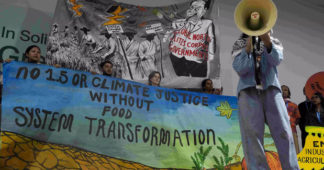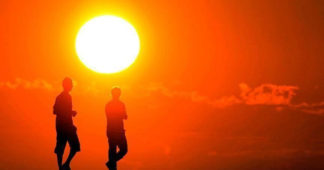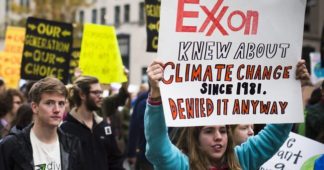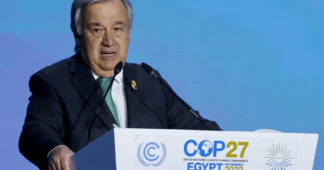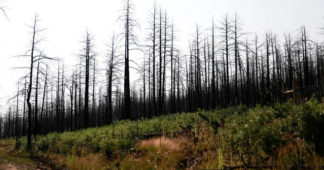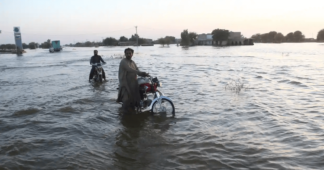The COP29 showed once again that global north countries have no interest in addressing their extensive role in the climate crisis and instead offer false solutions that further disadvantage countries in the Global South.
by Nicholas Mwangi*
Dec 9, 2024
The 29th UN Climate Change Conference (COP29) in Baku, Azerbaijan, concluded with a contentious agreement to allocate USD 300 billion by 2035 to help developing countries mitigate climate change. This commitment is but a fraction of the USD 1.3 trillion demanded by developing nations to address escalating climate crises and a far cry from the USD 6-7 trillion annual damages attributed to industrialized nations, according to UN estimates.
At COP29, activists from the Global South criticized the composition of the climate finance deal as “inadequate and hypocritical” as it’s dominated by loans rather than grants. They argue such funding mechanisms continue to perpetuate cycles of economic dependence, echoing decades of exploitative global financial systems. Africa, burdened by minimal historical responsibility for global emissions, finds itself in double tragedy, first as a victim of climate change and again through onerous loan conditions tied to mitigation and adaptation efforts.
Okakah, a Kenyan ecological activist and community organizer with the Kayole Community Justice Centre, told Peoples Dispatch: “The COP process has become a deadly joke for Africa. Promises made by the Global North have consistently fallen flat. This USD 300 billion is not climate finance; it is climate debt. Loans offered under the guise of help are shackles that deepen economic exploitation.”
The Africa Climate Summit, held in Nairobi in September 2023, also highlighted the continent’s precarious position in the global climate discourse. Leaders from 18 African countries, alongside international representatives, activists, and corporations, called for global financial reforms, renewable energy investments, and even floated the idea of a global carbon tax. Mainstream media hailed the summit as a groundbreaking moment, with Western leaders applauding its outcomes.
Yet, for many grassroots activists, the summit epitomized the capitalist responses that dominate environmental governance. While the calls for financial reforms and renewable energy were emphasized, the summit also amplified corporate narratives that often overshadow local and Indigenous solutions.
Kenyan activist Okakah reflected on the contradictions of the summit saying, “The Africa Climate Summit gave the appearance of progress, but behind the scenes, corporate interests loomed large. These forums are becoming platforms for greenwashing unless they center the voices of those most affected by the crisis, Africa’s marginalized and indigenous communities.”
Extractivism and corporate control in carbon markets
One of the most alarming trends for Africa is the rise of carbon credits as a central strategy for addressing emissions. While marketed as a solution to mitigate climate change, carbon markets have been criticized as a facade for continued extractivism and corporate control of minerals in Africa.
Africa’s vast forests, minerals, and land are increasingly commodified under the guise of carbon offset projects. Global corporations invest in these projects, claiming to “offset” their emissions while continuing business as usual in their countries. This arrangement does little to address emissions at the source and increase exploitation in Africa, where land grabs, displacement, and ecological degradation often accompany carbon offset schemes.
Carbon credits also divert attention from real solutions, drastic cuts in greenhouse gas emissions by the Global North. Instead, they allow wealthy nations to maintain their consumption patterns while outsourcing the burden of mitigation to African communities.
Okakah describes the carbon credit system as a “greenwashing” tool: “Carbon credits are a scam. They allow the rich to pollute while pretending to care. Meanwhile, in Africa, our forests, lands, and communities are exploited to prop up this global hypocrisy. Its colonialism rebranded for the climate age.”
The private sector’s growing influence in climate finance has further worsened the problem. Profiteering from crises that jeopardize millions of lives undermines the very principles of climate justice.
Corporations, particularly those in the fossil fuel and agribusiness sectors, wield immense influence in shaping environmental discourse and policy at COP meetings. Their lobbying ensures that solutions like carbon credits, which align with their profit motives, dominate the agenda. Meanwhile, grassroots voices advocating for systemic change are sidelined
Okakah’s vision for Africa’s climate future is rooted in grassroots action and global solidarity: “We need to reject these exploitative systems and take charge of our destiny. From agroecology to renewable energy, Africa has the potential to lead the world in sustainable solutions. But this requires dismantling the structures of capitalism and corporate greed that dominate the climate agenda.”
Corporate representatives continue to play a significant role in shaping discussions, often sidelining the demands of young African activists and movements that are actively resisting extractive industries and demanding systemic change.
“The voices of those on the frontlines of the crisis are drowned out by corporate narratives,” Okakah adds. “We must reclaim the agenda and ensure African solutions come from the grassroots, not from boardrooms.”
The dual outcomes of the Africa Climate Summit and COP29 point to a critical crossroads for Africa. The continent must move beyond summits that often serve as platforms for symbolic pledges and greenwashing. Instead, Africa must embrace a radical transformative agenda.
The next COP30 will be in São Paulo, Brazil. The world must confront the failures of capitalist approaches to climate governance. For Africa, the fight for climate justice is inseparable from the broader struggle against imperialism and exploitation.
“This is not just about climate,” Okakah emphasized. “It’s about dismantling the systems of power that perpetuate inequality. Africa must lead, not as a victim or abettor, but as a revolutionary force for justice and sustainability.”
The transformative agenda needed to address the climate crisis must be led by working-class and grassroots movements. By grounding initiatives in the lived realities of vulnerable communities and fostering cross-sector solidarity, movements can build a resilient base for ecological justice. At the same time, exposing the exploitative links between neoliberalism and environmental destruction is important. Mass mobilizations must amplify demands for systemic change, ensuring that Africa’s solutions emerge from the grassroots and serve the people, not profit.
* Nicholas Mwangi is a member of the Ukombozi Library in Kenya.
We remind our readers that publication of articles on our site does not mean that we agree with what is written. Our policy is to publish anything which we consider of interest, so as to assist our readers in forming their opinions. Sometimes we even publish articles with which we totally disagree, since we believe it is important for our readers to be informed on as wide a spectrum of views as possible.
